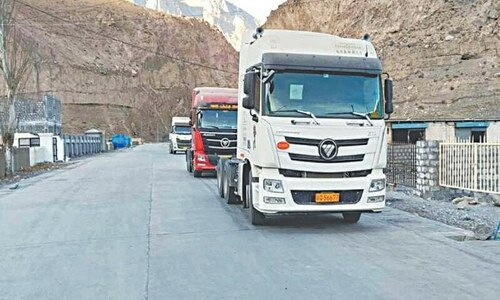
THROUGHOUT the 20th century, the erstwhile Federally Administered Tribal Areas (Fata) represented an important strategic location due to its proximity to Afghanistan. During the Soviet-Afghan war in the 1980s, Fata was used as a base for the Mujahideen who fought the Soviet occupation.
In the aftermath of the 9/11 attacks, Fata became a key battleground in the war against terrorism, as the military engaged in combat against Tehreek-i-Taliban Pakistan (TTP) and Al Qaeda militants in the region.
In 2018, Pakistani parliament passed a landmark reform bill that merged Fata with Khyber Pakhtunkhwa (KP) province, ending its status as a semi-autonomous region. The merger was aimed at improving governance and economic development in the region and bringing Fata on a par with the rest of the country.
However, the region continues to lag behind the national population in terms of development and progress. The tribal belt in Pakistan is often characterised by a lack of basic infrastructure, such as roads, bridges, electricity and clean water supply. This makes it difficult for people to access basic services, and limits the potential for economic development.
The literacy rate in the tribal belt is often lower than the national average, which limits the ability of individuals to participate in the economy, and makes it harder for the region to attract investment. The lack of quality education in the tribal region has resulted in high illiteracy rates, particularly among women and girls. This has limited the ability of the people to participate in mainstream national activity.
The lack of education has limited the job opportunities available to people in the tribal belt, making it difficult for them to escape poverty. It has also resulted in a lack of skills, and has very limited access to technology, which keeps the locals away from the thriving modern world.
It has limited access to healthcare in the region, which keeps people deprived of basic services. There is also social isolation in the region, as people are unable to engage with the wider world and participate in cultural and intellectual domains.
The poverty rate in the tribal belt is higher than the national average,
which means that people have limited resources to invest in their own develop-ment. The tribal belt has a history of conflict and political instability, which means the government agencies struggle to provide basic services, and private investment stands discouraged.
Above everything else, the tribal belt has been severely affected by terrorism. The people have suffered significant losses due to it, including loss of life and property. The conflict has created a climate of fear and insecurity, and the people live and work in a state of constant fear and uncertainty.
The conflict has forced many people to flee their homes and become internally displaced. This has disrupted the social and economic fabric of the region, as families have been separated and communities have been disrupted.
Terrorism also had a major impact on the economy of the region, as businesses have been destroyed and access to markets has been restricted. This has contributed to poverty and unemployment, exacerbating the already difficult economic situation in the tribal belt.
The government’s response has been slow, to say the least, indicating the lack of political will. Addressing the causes of terrorism and supporting the people of the region are critical to improving the situation and promoting peace and stability. The region has huge potential, but addressing these challenges requires sustained attention and investment from the government. The private sector will only follow if the government does it job well.
Mahir Hussain
Stockholm, Sweden
Published in Dawn, June 19th, 2023













































Dear visitor, the comments section is undergoing an overhaul and will return soon.